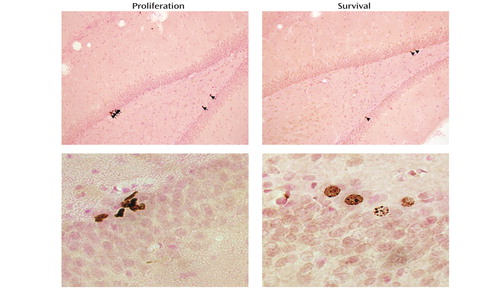Hippocampal Neurogenesis: A Matter of Survival
The hippocampus has long been known to play a prominent role in establishing new memories. More recently, the hippocampus has been implicated in several psychiatric illnesses (e.g., Alzheimer’s disease, schizophrenia, depression) and may even play a role in the traumatic memories central to PTSD. One of the most exciting discoveries about the hippocampus is its ability to give rise to new neurons throughout life, a process referred to as adult neurogenesis. Although the implications of adult neurogenesis for hippocampal function are not fully understood, data suggest that addition of new hippocampal neurons augments specific forms of learning and memory functions, whereas inhibiting neurogenesis diminishes adult learning and memory. This is intriguing since adverse events (stress, drug abuse) decrease adult neurogenesis, while positive events (voluntary exercise) increase it. Such links have encouraged researchers to pursue key questions such as where the newborn cells come from, what determines how many cells are born, and what determines which progenitor cells will mature and survive into functional new neurons. An emerging—and exciting—message from this research is that hippocampal function may be linked not to progenitor cell proliferation but rather to progenitor cell survival, or the proportion of proliferating cells that survive to become mature, functional hippocampal neurons.

Figure 1. Bromodeoxyuridine (BrdU) was injected to allow lineage tracing of newborn cells in the adult rat hippocampus. The arrows in the top row show that at a proliferation timepoint (typically 2 hours postinjection), there are usually more BrdU+ cells than at a survival timepoint (typically 4 weeks postinjection), indicating that only a proportion of newborn cells survive to maturity, when they will become functionally integrated into hippocampal circuitry. At proliferation, newborn cells are often found in clusters (bottom left), and individual cells are small and irregular. At survival, cells are no longer clustered and appear larger and rounder (bottom right), representing a more mature phenotype as the majority of cells have differentiated into neurons. Quantification of both proliferating and surviving cells is key to understanding how chronic drug treatment impacts neurogenesis and the function of the adult hippocampus.
Our recent work underscores the intriguing involvement of adult hippocampal neurogenesis in psychiatric disorders. We examined how adult neurogenesis is influenced by exposure to methylphenidate, a psychostimulant used in the treatment of youth and juvenile ADHD. We confirmed that methylphenidate administered during juvenile development produces long-term behavioral changes in adult animals. In addition, while methylphenidate did not alter the number of proliferating progenitor cells in the adult dentate gyrus, it did have had a long-term effect of decreasing the number of surviving progenitor cells, suggesting an overall decrease in the number of hippocampal neurons. Early life exposure to methylphenidate now joins a growing list of manipulations (e.g., maternal care, hippocampal-dependent learning) that alter progenitor cell survival but not proliferation. The incorporation of new neurons into the dentate gyrus may enhance hippocampal-dependent behaviors; therefore, reductions in this process could potentially compromise the function of the dentate gyrus in adults. While these implications have yet to be fully established, our studies suggest that alterations in neurogenesis could account for the impact of early life events on adult mental functioning.



